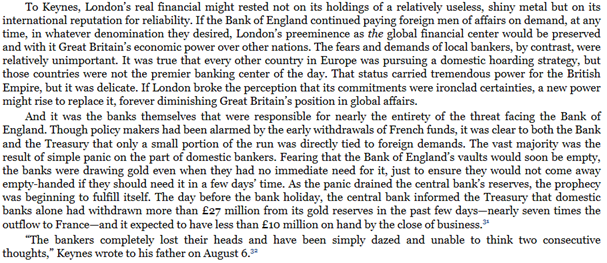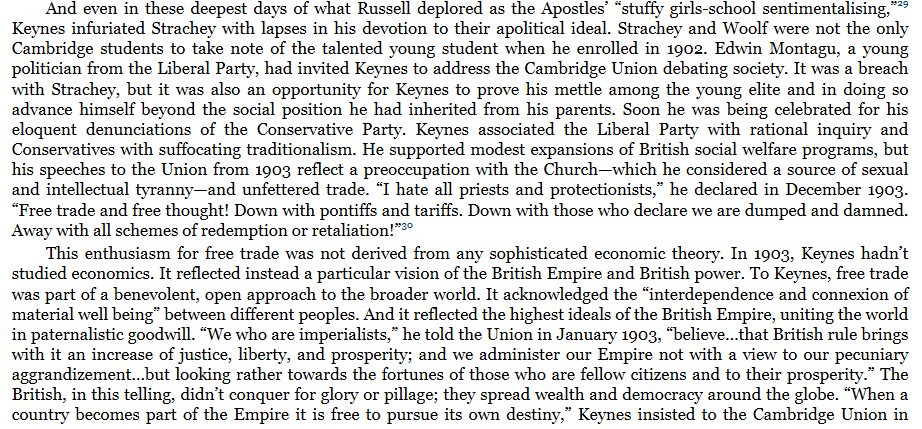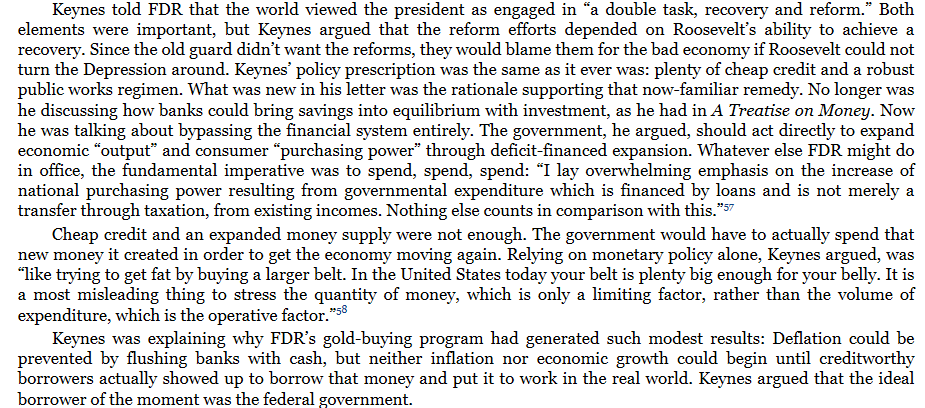1/ Long overdue but some thoughts on @zachdcarter& #39;s excellent book The Price of Peace. I hope I can add to this thread over the weekend.
From the jump, the role of the state power in finance is made explicit. Political control translates into financial flexibility
From the jump, the role of the state power in finance is made explicit. Political control translates into financial flexibility
2/ It’s remarkable to me that Keynes was able to understand how internal financial constraints can differ from external financial constraints and why. This is a distinction that the macroeconomics discipline has largely proceeded to unlearn (thanks Milton).
3/ The passages above also highlight an underrated problem of modern relevance: collective action problems among elites.
Bankers were unable to see what would serve their OWN interests, and absent a powerful enough state, would have self-cannibalized
Bankers were unable to see what would serve their OWN interests, and absent a powerful enough state, would have self-cannibalized
4/ In spite of Keynes’ ability to see the importance of the state, I think it’s also safe to say he didn’t have a coherent theory for the state’s actions. State power and private power have always been heavily intertwined and the lines b/w public and private are always blurry.
5/ @zachdcarter did a great job of capturing the full arc of Keynes& #39; views on trade and how the temptation to affiliate with cosmopolitan ideals is what ultimately guides so much of free trade advocacy, even when (or especially when) it is cloaked in economic theory.
6/ Part of the reason this book shines is that it can embrace Keynes& #39; strengths as an ambitious thinker while still reckoning directly with the more woefully naive aspects of his liberalism.
7/ Keynes& #39; blindspots keep cropping up throughout the book; this is a man very willing to place his faith in the capacity of:
-British imperialism to spread noble ideals
-rational discourse to persuade
-academic institutions to develop economic theory apolitically and objectively
-British imperialism to spread noble ideals
-rational discourse to persuade
-academic institutions to develop economic theory apolitically and objectively
8/ But in a lot of ways, Keynes& #39; faith in institutional capacity also allowed him to see some of the better ideas that were not so obvious. While FDR was committed to his regulatory agenda, it took Keynes& #39; convincing to realize why it must be paired with fiscal deficit expansion
9/ Even now, I think most macro-economists think of deficits in purely accounting terms: on average, outlays must be in balance with revenue, without a role for regulation.
And most regulatory thinkers lack a macro framework for understanding the effects of their proposals
And most regulatory thinkers lack a macro framework for understanding the effects of their proposals
10/ It takes a generous view of what institutions can do to see both the merit of an ambitious regulatory agenda but also recognize how its contractionary macroeconomic effects require offsetting fiscal expansion to ensure broad economic advancement.
11/ This kind of integrated approach to macro policy mgmt is uncommon to see nowadays (unless you& #39;re reading @NathanTankus). It reflects an important distinction b/w making policy based on a.) the state& #39;s capacity to tax and regulate vs. b.) the precise amt of revenue collected.
12/ To some, the last third of the book might seem gratuitous, since it largely deals with the period following Keynes& #39; death. But I& #39;m glad @zachdcarter included it because Keynes& #39; impact was in some ways profound and in others, highly bastardized
13/ Even though I would call myself a Post-Keynesian, I didn& #39;t have a sufficient appreciation (until reading this book) for the role of the Second Red Scare in facilitating that bastardization, at least in terms of mainstream understandings of Keynes& #39; insights
14/ So instead of focusing on how private sector balance sheet constraints can bind (often suddenly), and thereby need fiscal expansion to avoid recession, the mainstream "New Keynesian" view is rooted in a ridiculous story of how sticky prices or wages are the cause of recession
16/ The ivory tower that Keynes hoped would develop technocratic solutions to minimize unemployment instead turned to the politically inclined Milton Friedman (the man advised Goldwater!), who, while mainly just iterating off of Keynes, had an entirely different political agenda.
17/ The book is called the Price of Peace but the way in which Keynes& #39; insights were put into practice in the US in the 50s and 60s are intertwined w/ discretionary military adventurism
18/ I& #39;m sure those who are fond of Hayek and Friedman won& #39;t take as well to Zach& #39;s commentary here. The most charitable view to take is that skepticism of state power in the face of ow it was being abused (Vietnam, Jim Crow) and failing to deliver on its promise (Great Inflation)
19/ But a more holistic view of the postwar period that Zach takes us through shows how the challenges that come with political power and the state can& #39;t be sequestered through heavy insulation of technocrats or a blind trust in the "decentralized knowledge of markets"
20/ The state& #39;s willingness and capacity to shape macroeconomic outcomes (and financial market outcomes) is a direct translation of political choices and policy preferences.
End/ @zachdcarter& #39;s book was a great read. Tons of history and incisive political commentary. Definitely worth your time

 Read on Twitter
Read on Twitter








